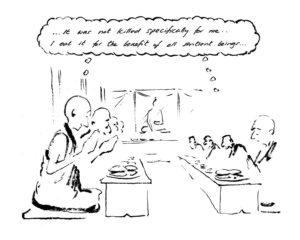Definition of the Week (28) – Ethics/Morality
Lama Tsong Khapa:
The nature of ethics is the intent of abandonment, mentally reversing from harming others. This is mainly from the point of view of the ethics of restraint.
Gyaltsab Je:
Morality Depends On the Mind
(Completing the Morality Gone Beyond Does Not Depend on the Absence of Sentient Beings that One Could Kill; It Is Completed by Meditating on the Mind of Abandoning)
Completing the Morality Gone Beyond Does Not Depend on the Absence of Sentient Beings that One Could Kill
Fish and so forth, where should they flee to [11ab]
So as not to be killed?
It follows that the completion of the morality gone beyond does not depend on removing all sentient beings that could possibly be killed, because it is unfeasible to move all the animals such as fish and so forth to a safe place.
It Is Completed by Meditating on the Mind of Abandoning
Through the mind of abandoning, [11cd]
Morality goes beyond, it is taught.
For this reason the morality gone beyond is achieved by completing the meditation on the mind of abandoning, such as on the mind abandoning the thoughts of killing or stealing.
From a sutra:
If the morality gone beyond is explained: It is the intent to give up harming others.
Chandrakirti:
By excelling in all ten virtuous paths [2.2]
He becomes exceedingly pure,
Eternally pure, like an autumn moon,
Beautified by such peace, radiance.
The first Dalai Lama:
Question: ‘Do those ten karmic paths not also exist on the first ground?’
Answer: ‘Of course they do. But the bodhisattvas abiding on the second ground are superior in morality to the first ground because they became exceedingly pure by excelling in all ten virtuous paths.
Bodhisattvas abiding on the second ground of eternally pure morality became like an autumn moon because they are beautified by the peace arising from having restrained the doors of the sense powers, and by a the radiance of a brilliant aura.’


